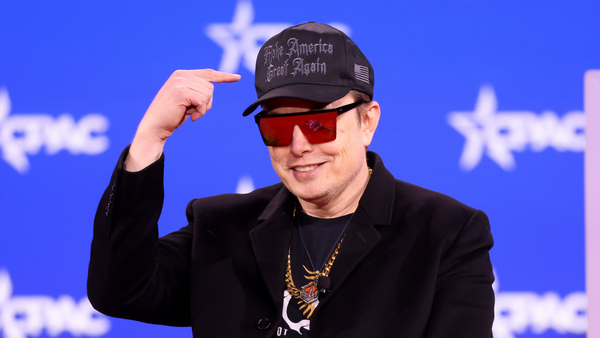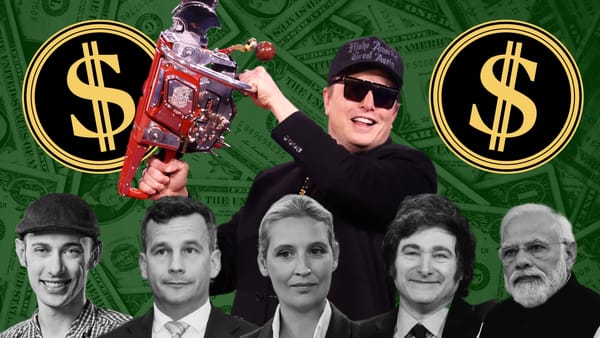
Elon Musk has been warning about population decline and smaller families for years. In his 2015 biography, he’s quoted as saying, “if each successive generation of smart people has fewer kids, that’s probably bad.” Musk is explicit that “smart” people need to be having more kids — he has nine living children, that we know of — but doesn’t go so far as to say that other people should be having fewer. After all, he does want the population to grow.
One of the problems with his narrative is that the global population is growing — it hit 8 billion people last year — as is the US population, though the rates of growth are slowing. Musk, however, acts as though we’re already in a state of decline, which suggests he’s more concerned with the growth rate of particular segments of the population than the population as a whole — as his concern about the procreation of “smart” people suggests.
Almost as long as Musk has been talking about this, there have been questions about how those concerns were reflected in his politics. For well over a decade, Musk was seen as a liberal hero building electric cars, but in recent years he’s emerged as a key figure in the extreme right-wing turn in Western politics. We know that he runs racist and sexist workplaces, and has become a vocal opponent of trans rights, despite having a trans daughter who has understandably disowned him.
In 2021, not long after Musk shifted his company headquarters to Texas in pursuit of lower taxes, the state passed incredibly restrictive abortion legislation. Governor Greg Abbott was asked how this might affect companies moving to Texas, like Musk’s firms, to which he replied, “Elon consistently tells me he likes the social policies in the state of Texas.” Musk responded with a tweet saying he would “prefer to stay out of politics.” Well, he’s now much more open about those political views.
Earlier this week, Fox News aired a two-part interview Tucker Carlson did with Musk, where he asked for the billionaire’s perspective on those issues. In an unhinged response, Musk argued that birth control and abortions were to blame for separating sex from procreation — which, to be clear, he considers a bad thing that we haven’t yet “evolved” to accommodate for. He continued to say that, “if we don’t make enough people to at least sustain our numbers, perhaps increase a little bit, then civilization’s going to crumble.”
We can debate whether Musk knows what he’s doing here — it’s obvious he thinks he’s much brighter than he is — but he’s very clearly laundering eugenicist and white nationalist views. When he refers to “smart” people needing to have more “smart” kids, he’s suggesting that IQ — a deeply flawed concept in itself — is passed through genetics, and when he warns about the crumbling of civilization, it’s hard not to hear the deeply racist concerns about the decline of the white race that have become far too common in recent years.
Eugenics has a long history in Silicon Valley, and Musk is arguably the most visible face of its resurgence. These racist ideas pervade the tech industry, as a growing institutional foundation has been built — with the funding of prominent industry figures, like Musk — to spread them. These organizations exist to ensure today’s tech billionaires keep the power they’ve amassed and are seen not just as people who lucked into vast fortunes, but as inherently — even genetically — superior to everyone else. They want us to believe they deserve their positions at the top of the hierarchy.
Eugenics in the Valley
The narrative Silicon Valley crafts about itself has long distracted us from its history and the reality of the impact it has had on the world. When we look past the rosy stories of innovative founders and groundbreaking tech firms, what we see can be quite damning. In Palo Alto: A History of California, Capitalism, and the World, Malcolm Harris unearths this history, and in particular the promotion and even championing of eugenics by many of the prominent people that set the foundations on which the industry was built.
Stanford University, for example, was built on the site of the Stanford Stock Farm, where Leland Stanford “disrupted” the breeding of racing horses to start training them much younger, even if that meant more horses died in the process. But that process then inspired education reformers and the approach to training students at the university, which always wanted to focus on the best performers. As Harris put it in an interview with me in February, it was a “jump between horse stock capital to human capital.”
Throughout its history, Stanford has provided a home for many prominent eugenicists to develop and espouse their beliefs. The university’s first president, David Starr Jordan, was “one of the most prominent eugenicists of the early 20th century.” He not only hired other eugenicists, but shaped the university to make it “a hotbed of social Darwinist and eugenicist ideology.” Among his recruits was Ellwood Cubberley, who wrote in 1916 that “our schools are, in a sense, factories” where students were to be shaped for society, and the “elimination of waste” and the “continuous measurement of production” would be required. He compared education to agriculture, where people’s potential could be judged based on their heredity — if their parents were “smart,” let’s say, they would be too.
Cubberley recruited Lewis Terman to the university, who developed the Stanford-Binet IQ test to improve the measurement of students. The test claimed to quantify intelligence, but as Ben Maldonado explained, it was “developed with the assumption that non-white races were inferior.” Terman used its scores to argue that Indigenous, Mexican, and Black people were inherently less intelligent than whites, and the test was later applied to determine who should be sterilized by the state. These men supported racial restrictions on immigration and treating certain races as inferior to white people. Terman was particularly focused on identifying “sexual deviancy” and those who didn’t conform to traditional gender roles to promote their “eugenic eradication,” as Maldonado put it, and protect the white, heterosexual family.
William Shockley, who co-invented the transistor and arguably put the “silicon” in Silicon Valley, was also a professor at Stanford in the 1960s and 70s, continuing this tradition of eugenic advocacy. He warned of “evolution in reverse” as people with lower IQs (non-whites) were having more children than those with high IQs (whites). Again, he believed that intelligence and other traits were genetically inherited, and was “alarmed” that people like him were not having large families while “those with the least intelligence were having the most children.” (Sound familiar?) He also advocated for the US government to pay Black people to get themselves sterilized. Last year, Science published an editorial criticizing its own failure to call out Shockley’s racism beginning in 1968, and for repeating “the familiar trope that Shockley was simply asking questions about the role of race in intelligence.”
Bringing eugenics back
These views are not relegated to a more shameful moment in our history. They’ve maintained a committed following over the decades, and are in the midst of a renaissance as a set of worldviews pushed and funded by some of the most powerful people in the world bring eugenic ideas back into the mainstream. The triad of effective altruism, longtermism, and pronatalism are central to this effort, and while not all of their adherents are eugenicists, there is no denying how those movements are rejuvenating a set of ideas that have no place in the modern world.
Let’s begin with effective altruism. At its core, it’s a belief that philanthropy is the means to address the world’s problems, but also that those philanthropists need to use data to figure out the most effective means of deploying their wealth. For a long time, it promoted the concept of “earn to give” where movement leaders told members that instead of going to work in the non-profit sphere on issues they cared about that they should join high-earning sectors so they could then donate their earnings. The most notable example of this is Sam Bankman-Fried, the disgraced founder of FTX, who was planning to go into animal activism, but after a conversation with effective altruist William MacAskill in college, decided to go into finance and eventually crypto scams. We can see how that turned out.
It’s easy to see this kind of charity as benign or even necessary, but if we take a step back we can see how pernicious this thinking actually is. Spreading the idea that rich people donating their wealth is the means to solve key global challenges is a way to put decision-making power in their hands instead of in the hands of governments or the public, and serves to justify the inexcusable levels of inequality in many of our societies. The structure of effective altruist giving has been criticized as being racist and anti-democratic, while their measures of effectiveness disincentivize many types of investment that could actually set communities in the Global South up for longer term prosperity instead of just addressing short-term problems. In short, the idea is that the people at the top know best and should make decisions for everyone else.
This perspective extends into longtermism, which grew out of the effective altruist movement. If effective altruism is concerned with how rich people can make the biggest impact today, longtermism extends the timeline to humanity’s entire future existence. It considers a person today to effectively be of equal value to a person who could exist at any time in the future, meaning that speculatively reducing the chance of future extinction — if that’s something we can ever be sure of — can have a much greater impact than solving real-world challenges in the present. AI researcher Timnit Gebru has said that longtermism is “eugenics under another name,” while philosopher Émile Torres has gone through the histories of its most prominent advocates to illustrate the eugenic ideas underpinning their philosophies.
Longtermists believe that they should chart the future of humanity from their ivory towers and C-suites because their wealth gives them a longer term view that people with more immediate concerns do not consider, yet that perspective is one that serves their interests while failing to address our pressing challenges — even downplaying the risk presented by climate change. Instead, they advocate to colonize the cosmos and develop a race of “posthumans” that are superintelligent, immortal, and may simply be digital “beings” that exist in computer simulations established on various celestial bodies in the vicinity of Earth. But that doesn’t mean they’re not still concerned with who’s having kids — and what kind of kids they’re having.
One of the most prominent advocates for longtermism is Nick Bostrom, an Oxford University philosopher and head of the Musk-funded Future of Humanity Institute. He’s written as recently as 2017 about how too many lower IQ people are having children in “modern societies,” and earlier in his career warned about less “intellectually talented individuals” outbreeding more “intellectually talented” people. His work has pulled from many eugenicist thinkers in the past, and in 2014 he argued that by “selecting embryos with the genetic markers of superior intelligence, creating new embryos out of them (via stem cells) and then repeating this process 10 times, you could get IQ gains of up to 130 points,” explained Torres.
This naturally leads us to pronatalism. In November, Insider journalist Julia Black called it a “a quiet but growing movement taking hold in wealthy tech and venture-capitalist circles.” Pronatalists take the quantitative nature of effective altruism and longtermism and apply it to procreation, expressing not just a concern with declining birth rates — particularly among wealthy and intelligent people, and echoing the language of white nationalists — but also the desire to choose their “best” embryos to essentially breed a higher class of human. The couple Black profiled for the piece were thinking many generations into the future and believed in predestination: the tenet that “certain people are chosen to be superior on earth and that free will is an illusion.”
In a similar way as longtermism seeks to allow the wealthy and powerful to shape the future of humanity, there’s a clear desire among pronatalists to do something similar by spreading their genes — which they believe are superior — throughout the human population. An anonymous source who spoke to Black said that Musk was speaking as early as 2005 about “populating the world with his offspring,” and had an obsession with Genghis Khan, whose DNA is reportedly still present in much of the human population. Jeffrey Epstein wanted to do something similar.
Protecting the hierarchy
Many of the tech geniuses who got fabulously wealthy over the past two decades did so not because of skill, but luck. They happened to be born at the right moment and got into an industry as it was taking off. They didn’t build the ship or steer it; they were simply along for the ride and the last thing they want is for the rest of us to realize that. When we do, it becomes very clear they don’t deserve to be praised or to have unimaginably vast fortunes that allow them to reshape our politics and society to serve themselves. To maintain their positions, they need us to believe that they’re inherently better than everyone else — and that’s at least part of the reason they’re embracing eugenics.
Through effective altruism, longtermism, and pronatalism, they’re trying to have us believe that they should remain in charge and we should let them set the course of our collective future. The idea is that since they’ve built large tech companies and accumulated sizeable bank balances that they’re best placed to set societal priorities. Yet nothing could be further from the truth — and more people are recognizing it.
In recent years, the public has turned on the tech elite. Mark Zuckerberg is a laughing stock, Jeff Bezos is despised, Elon Musk has fallen from grace, and even Bill Gates’ attempts to use his fortune to clean up his reputation aren’t working so well anymore. That’s exactly why we’re seeing them ramp up the pressure to sell us on their superior intelligence and natural place at the top of the hierarchy. But we must reject them and everything they stand for at all costs.










Member discussion